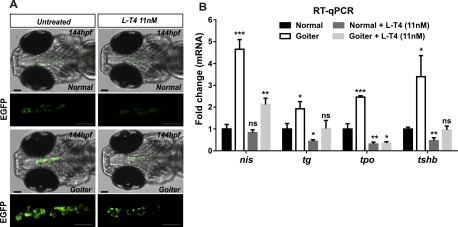Fig. S1 L-T4 supplementation of duox sa13017 mutant larvae. The progeny of heterozygous duox sa13017 fish (Tg(tg:nlsEGFP) background) were selected based on thyroid phenotypes at 100 hpf and corresponding larvae were treated or not with 11 nM L-thyroxine (L-T4) until 144 hpf to be analyzed. (A) Epifluorescence live imaging of thyroidal EGFP signal. Representative images (ventral view of the head region, anterior to the left, scale bars: 75 μm) showing a marked decrease of the EFGP signal in L-T4 treated animals. (B) Comparative fold change mRNA expression of tg, slc5a5/nis, tpo and tshb genes compared to normal (WT or heterozygous mutants) non-treated animals. The means with SD are presented on the graphs (n = 3). Mann-Whitney tests were performed to compare normal non-treated larvae with all other conditions.
Reprinted from Molecular and Cellular Endocrinology, 500, Giusti, N., Gillotay, P., Trubiroha, A., Opitz, R., Dumont, J.E., Costagliola, S., De Deken, X., Inhibition of the thyroid hormonogenic H2O2 production by Duox/DuoxA in zebrafish reveals VAS2870 as a new goitrogenic compound, 110635, Copyright (2019) with permission from Elsevier. Full text @ Mol. Cell. Endocrinol.

